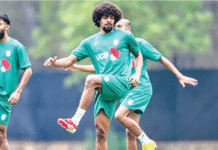
Never failing to excavate positives from the deepest of holes following disastrous performances is probably the only persistent thing about Bangladesh’s cricket. So, walking on the same line as the Bangladesh Cricket Board (BCB), let’s begin by finding some positives from the inclusion of Shuvagata Hom in the preliminary 21-member Test squad for the upcoming Sri Lanka tour.
Is it not a positive sign that the selectors kept their ‘vigilant eyes’ on a ‘consistent performer’ for five long years before finally deciding to call him back? Should Hom be delighted to finally get a chance to revive his international career or be worried about being dropped after inadequate opportunities? The latter seems to be more likely considering the past trend of BCB.
 For all latest news, follow The Daily Star’s Google News channel.
For all latest news, follow The Daily Star’s Google News channel.
In 2016, when former international players Shahriar Nafees and Rakibul Hasan had been included in a 30-member preliminary national squad, they considered it a lifeline, if not a signal of a revival of their international careers. The rest was history for the two batsmen but Hom can still also think along the same line. Is it not a positive sign that his age of 34 did not prove a barrier for the selectors? Is it not a message for players like Tushar Imran, aged 37, that everything is not done and dusted?
The selectors always talk about injecting new blood for a new mission after dismal outings, boast about the long queue of talents and prospects in the pipeline and pretend-ponder over implementing and executing a long-term policy for the betterment of Bangladesh cricket. But the truth is, all that the players need to do to pass their rigorous screening process is wait for someone else’s failure in the team to come into the spotlight once again.
Although the general audience does not find any logic behind picking and dropping a player who has been providing similar kinds of performances over the years, selectors never fail to give reasons for sudden inclusions.
Hom came to the spotlight in 2011 as a specialist batsman and a utility player, then made his second comeback in 2015 as a good spin bowler who was by trade a batsman and finally made the latest comeback after five years as a batting all-rounder, whose off-break is considered something handy.
Hom had hardly justified all that adulation like many others in the team in his first five-year international career, a time in which he played 8 Tests, 4 ODIs and 5 T20Is. Some could argue about his ODI average of 35.00, but if we look back at Hom’s career, it just perplexes us.
Hom has been selected as a replacement for premier all-rounder Shakib Al Hasan, who is skipping the Sri Lanka tour due to his commitments in the IPL. But is there any specific role for Hom that has been chalked out in the team? This very issue of fixing a specific role is not something new; the same management failed to carve out specific roles for many players, including Soumya Sarkar, who was dropped for the Sri Lanka tour after being suddenly recalled directly into the playing eleven in the second Test against the West Indies in February this year despite not even being included in the original 18-member Test squad for the Windies Test series.
The team management also proved unable to define a specific role for Soumya in limited-overs formats. He played at a new number seven position during the Windies series only to find himself back at the top in the recently-concluded New Zealand series.
Going back to Hom’s inclusion, it is nothing against a player getting an opportunity and certainly, Hom, who is coming back to the side after a long exile, should remain focused on performing whenever the opportunity comes.
Yes, there is a policy to cut and chop, but it cannot be questioned because selectors can say they are trying to do something instead of sitting idly by. Is such promptness not a positive sign?









